High-Quality Doxycycline HCl CAS 24390-14-5 with best price
Product Description
By reversibly binding to the receptor on the 30S subunit of the bacterial ribosome, doxycyclin interferes with the formation of ribosome complex between tRNA and mRNA, and prevents the peptide chain from lengthening protein synthesis, so that the growth and reproduction of bacteria are rapidly inhibited. Doxycycline can inhibit gram-positive and gram-negative bacteria, and has cross resistance to oxytetracycline and aureomycin.
Appliation
For the treatment of infectious diseases caused by gram-positive and gram-negative bacteria and mycoplasma, such as porcine mycoplasma, colibacillosis, salmonellosis, pasteurellosis, etc.
Adverse reactions
The most common adverse reactions of oral doxycycline hydrochloride in dogs and cats are vomiting, diarrhea, and decreased appetite. To reduce adverse reactions, no significant decrease in drug absorption was observed when taken with food. 40% of dogs receiving treatment showed an increase in liver function related enzymes (alanine aminotransferase, alkaline phosphatase). The clinical significance of increased liver function related enzymes is not yet clear.












